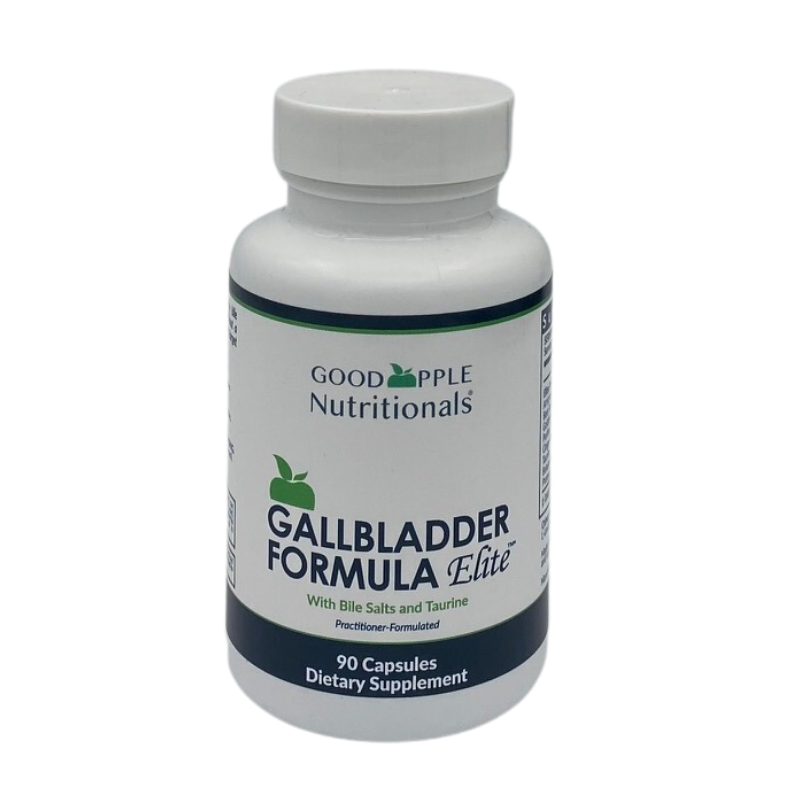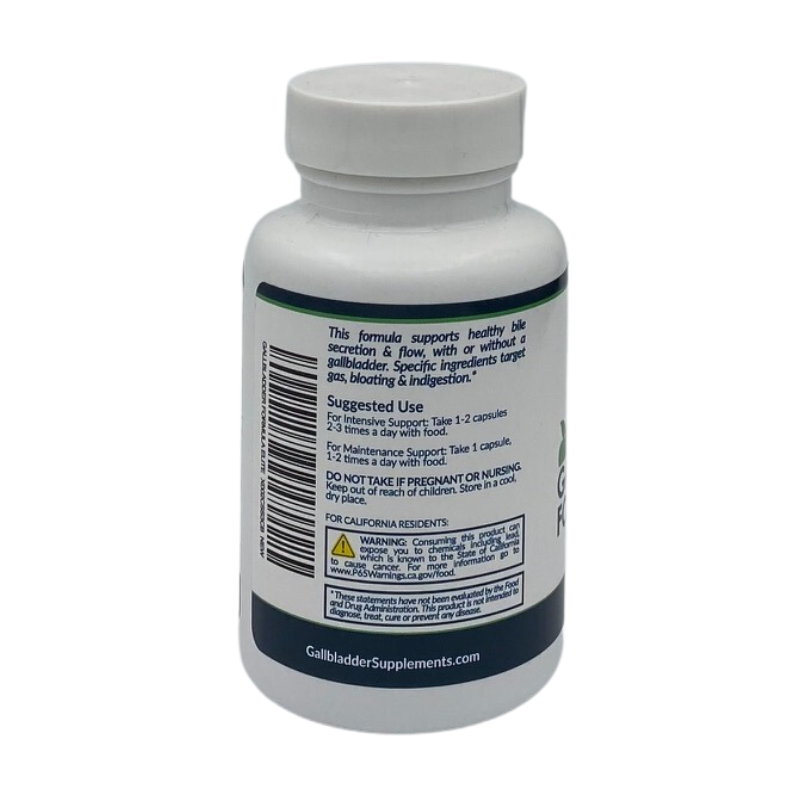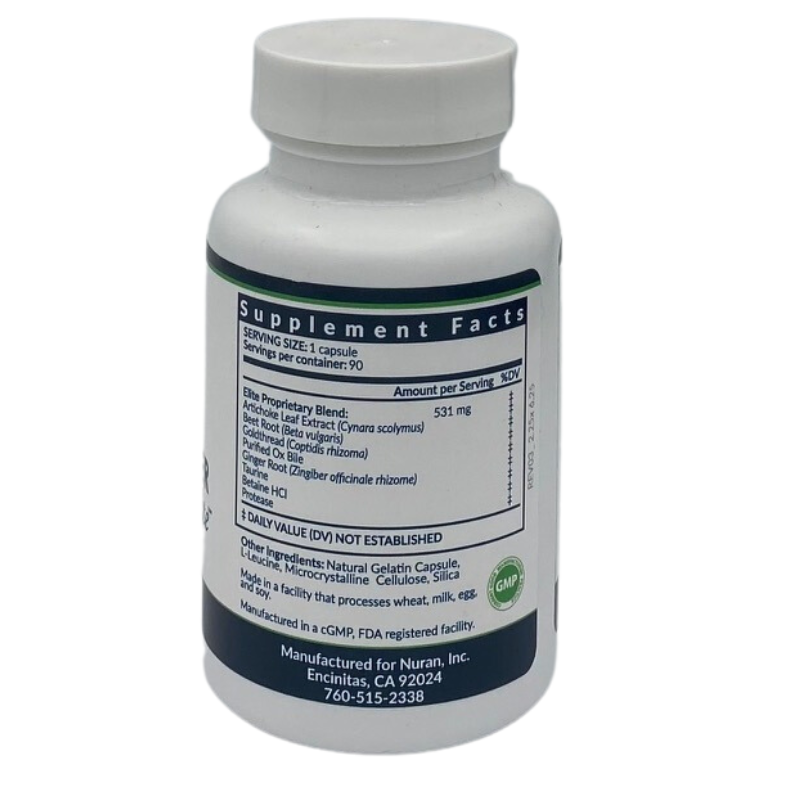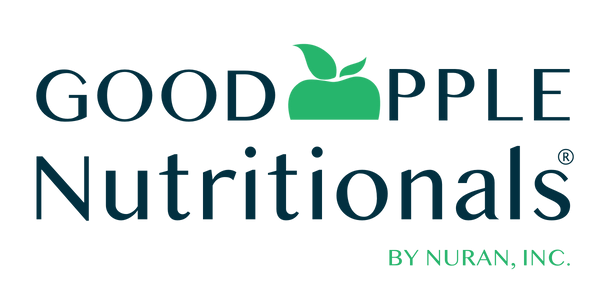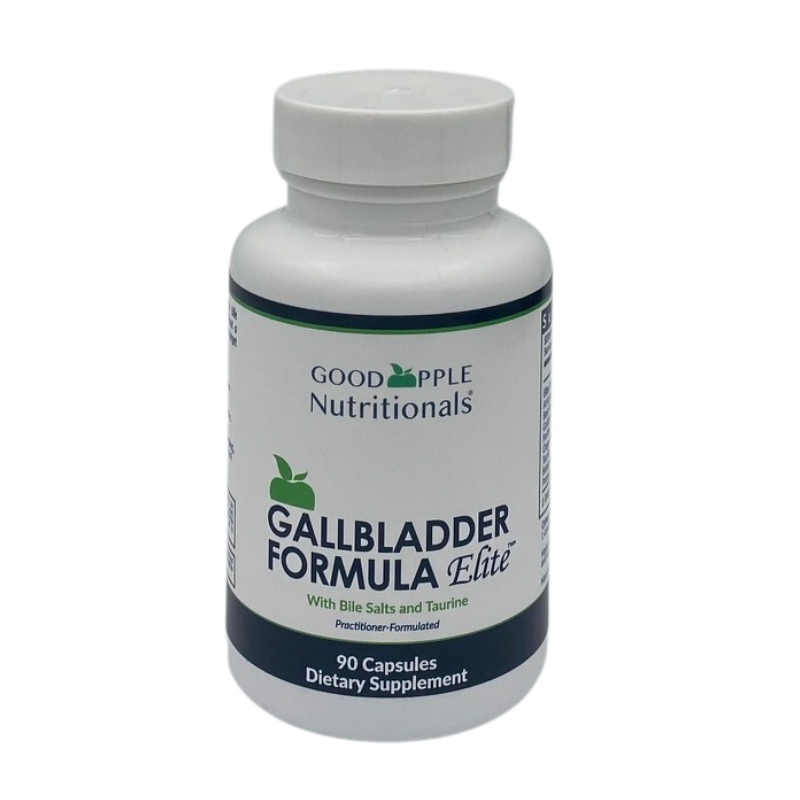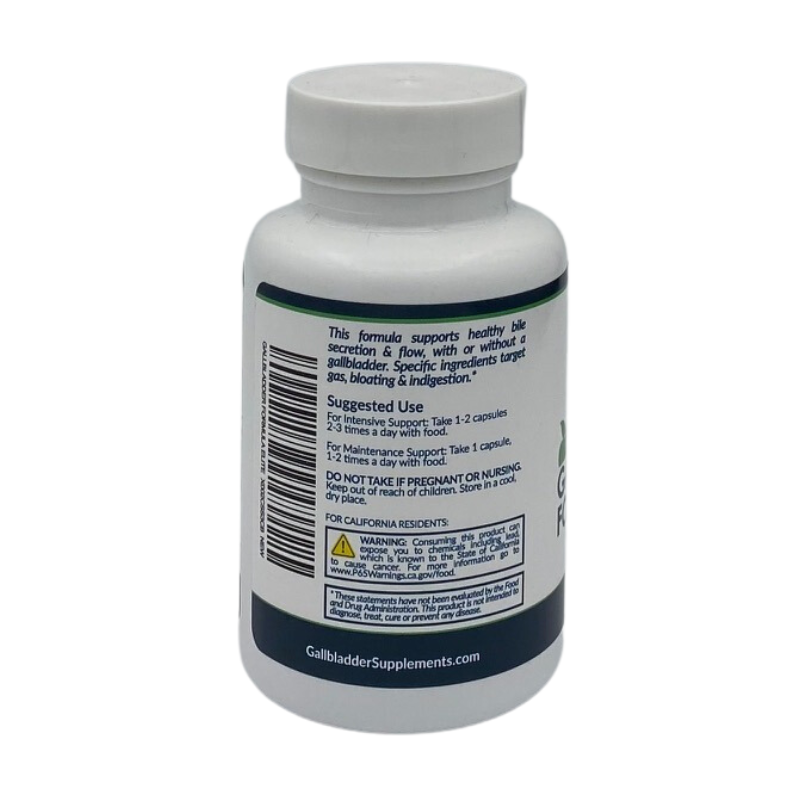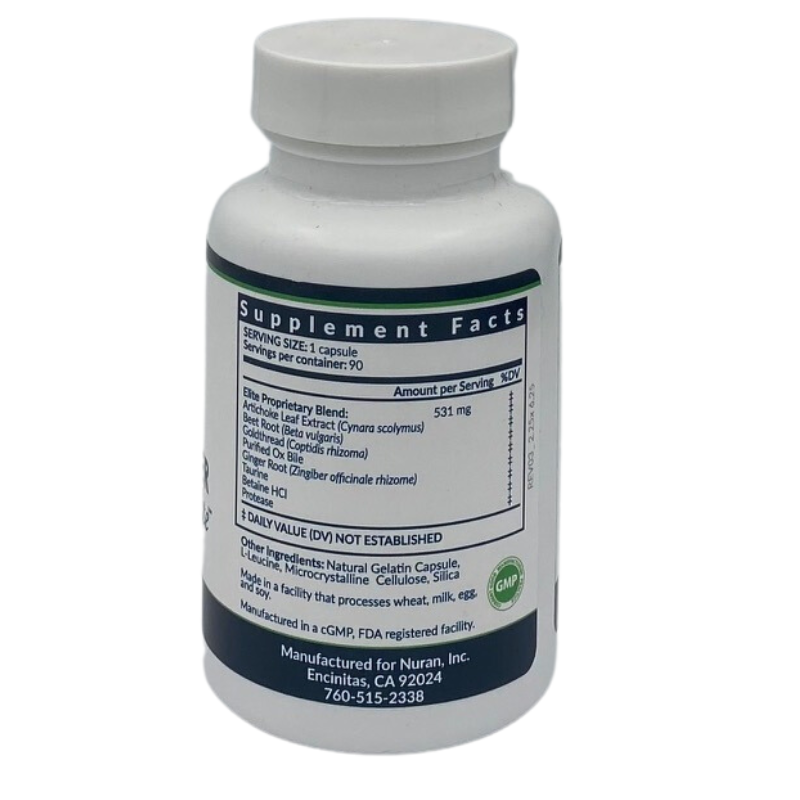GoodApple Nutritionals
Gallbladder Formula Elite - with Bile Salts
Gallbladder Formula Elite - with Bile Salts
2.75 / 5.0
(4) 4 total reviews
Couldn't load pickup availability
Bile Salts, traditional gallbladder herbs, nutrients and digestive enzymes designed to support bile flow and gallbladder function, gas & bloating, indigestion & inflammation. Supports gallbladder function as well as symptoms after gallbladder removal.
Bile Salts formula with herbs and nutrients designed to promote bile flow and to support gallbladder function as well as bile function after gallbladder removal. This formula supports not only the digestion of fats, but of all nutrients.
NOTE: This product should not be used while nursing or pregnant.
It contains:
- Bile salts to support fat digestion and bile flow
- Coptis Chinesis with berberine to support blood sugar and inflammation
- Ginger to support digestion, nausea and inflammation
- Artichoke leaf extract to support liver detoxification, healthy bile flow, relaxation of muscle tissues and healthy cholesterol
- Taurine for support of fat digestion and bile flow as well as anxiety
- Protease enzymes (vegan) to support protein digestion
The Benefits of Bile Salts
Bile salts play a crucial role in digestion and nutrient absorption, particularly in the breakdown and absorption of fats.
Emulsification of Fats
Bile salts act as emulsifiers, which means they break down large fat globules into smaller droplets. This process is essential because it increases the surface area of fats, making them more accessible to digestive enzymes called lipases. The emulsification of fats by bile salts allows lipases to efficiently break down fats into smaller components, such as fatty acids and glycerol, facilitating their digestion and absorption in the small intestine. (1)
Facilitation of Micelle Formation
After the emulsification of fats, bile salts further aid in the formation of micelles. Micelles are tiny structures composed of bile salts, fatty acids, and fat-soluble vitamins. These micelles act as transport vehicles, carrying the partially digested fats and fat-soluble substances to the surface of the small intestine lining, where they can be absorbed more efficiently. This process is vital for the absorption of fat-soluble vitamins (A, D, E, and K) and other essential lipids. (2)
Regulation of Gut Microbiota
Bile salts not only aid in digestion but also influence the composition of the gut microbiota. Some studies suggest that bile salts can act as signaling molecules for certain gut bacteria, affecting their growth and metabolism. By modulating the gut microbiota, bile salts can have indirect effects on digestion and overall gut health. (3)
The Benefits of Coptis Chinesis
Anti-inflammatory Properties
Coptis Chinesis contains bioactive compounds, such as berberine, which have demonstrated anti-inflammatory effects. Inflammation in the digestive tract can lead to various gastrointestinal disorders, and by reducing inflammation, Coptis Chinesis may help alleviate symptoms related to digestion. (4)
Antimicrobial Activity
Traditional Chinese medicine has used Coptis Chinesis for its antimicrobial properties. It may help combat harmful bacteria in the gut that could cause digestive disturbances, promoting a healthier gut environment. (5)
Stimulating Bile Production
Coptis Chinesis has been traditionally used to support liver health and stimulate bile production. Increased bile secretion aids in the digestion of fats, which may improve overall digestive function. (6)
The Benefits of Ginger
Relief for Nausea Associated with Indigestion
Ginger has long been recognized for its antiemetic properties, meaning it can help alleviate nausea and vomiting. Ginger's anti-inflammatory and smooth muscle relaxing properties might contribute to its potential effectiveness in managing nausea associated with gallbladder issues. A study published in the Saudi Medical Journal found that ginger supplementation improved various gastrointestinal symptoms, including nausea, in patients with functional dyspepsia. (7)
Enhancement of Gastric Emptying and Digestive Function
Ginger may promote better digestion by enhancing gastric emptying. It can help accelerate the movement of food from the stomach to the small intestine, which aids in the overall digestive process. One study in healthy volunteers found that ginger significantly increased the rate of gastric emptying, potentially supporting the management of dyspepsia. (8)
Anti-inflammatory and Antioxidant Effects
Chronic inflammation in the digestive tract can lead to various gastrointestinal disorders. Ginger contains bioactive compounds with anti-inflammatory and antioxidant properties, such as gingerol and shogaol. These compounds may help reduce inflammation in the gut and protect against oxidative stress, potentially supporting digestive health. A study in rats with ulcerative colitis demonstrated that ginger extract reduced inflammatory markers and oxidative stress, suggesting its potential as an adjunct therapy for inflammatory bowel diseases (9)
The Benefits of Artichoke Leaf
Promotion of Bile Production and Secretion
Artichoke leaf is known to support liver health and stimulate bile production and secretion. Bile plays a crucial role in the digestion and absorption of fats and fat-soluble vitamins in the small intestine. Several studies have demonstrated artichoke leaf's choleretic (bile-stimulating) properties. One randomized clinical trial involving healthy volunteers found that artichoke leaf extract increased bile secretion significantly compared to a placebo group. (10)
Improvement of Digestive Function
Artichoke leaf has been traditionally used to relieve symptoms of indigestion and support overall digestive function. Some studies have shown that artichoke leaf extract may help reduce symptoms of dyspepsia, such as bloating, flatulence, and abdominal pain. A clinical trial involving patients with functional dyspepsia reported that artichoke leaf extract significantly improved dyspeptic symptoms compared to a placebo. (11)
Antioxidant and Anti-inflammatory Effects
Artichoke leaf contains bioactive compounds, including flavonoids and phenolic acids, which possess antioxidant and anti-inflammatory properties. These compounds may help protect the digestive system from oxidative stress and inflammation. Some studies have indicated that artichoke leaf extract may have a beneficial effect on gut health by reducing inflammation and oxidative damage. For instance, one study demonstrated that artichoke leaf extract had anti-inflammatory effects in the colon, making it a potentially beneficial agent for inflammatory bowel diseases. (12)
The Benefits of Taurine
Antioxidant and Anti-inflammatory Properties
Taurine possesses antioxidant and anti-inflammatory properties, which may help protect cells from oxidative stress and inflammation. Studies have shown that taurine can scavenge free radicals and reduce markers of inflammation. A study on inflammatory bowel disease found that taurine supplementation reduced inflammation and oxidative stress in the colon. (13)
Gut Barrier Integrity
Some studies suggest that taurine may help maintain the integrity of the gut barrier. The gut barrier plays a crucial role in preventing harmful substances from entering the bloodstream and protecting against inflammation and gastrointestinal disorders. (14)
Gut Microbiota Modulation
There is emerging evidence suggesting that taurine might influence the gut microbiota. The gut microbiota plays a vital role in digestive health and overall well-being. Some animal studies have shown that taurine supplementation can influence the composition and metabolism of gut bacteria, which may have implications for gut health. (15)
Gallbladder Formula Elite – A Practitioner Created Formula
Nuran, Inc. is owned by Deborah Graefer, Licensed Acupuncturist, Masters in Traditional Oriental Medicine. Deborah has been specializing in gallbladder problems since 2001 and formulating supplements for gallbladder support for more than a decade.
Goodapple Nutritionals products are manufactured in Current Good Manufacturing Practices (cGMP) certified facilities. Under cGMP regulations, manufacturers are required to evaluate the identity, purity, strength, and composition of ingredients. Finished products are also tested to ensure they meet the highest quality standards.
Note: These statements have not been evaluated by the FDA and are not intended to diagnose, treat, cure or prevent disease. All information provided here is for informational purposes only and is not intended to substitute advice from your physician.
References:
1. Maeda, H., & Yamagata, S. (2014). Purification of bovine liver bile salt-stimulated lipase using a new hydrophobic column chromatography. Journal of Chromatography B, 944, 101-107
2. Hernell, O., Blackberg, L., & Staggers, J. E. (1984). Bile salt-stimulated lipase of human milk: characteristics of the enzyme in the milk of mothers of premature and full-term infants. Pediatric Research, 18(3), 286-291
3. Joyce, S. A., MacSharry, J., Casey, P. G., Kinsella, M., Murphy, E. F., Shanahan, F., ... & Hill, C. (2014). Regulation of host weight gain and lipid metabolism by bacterial bile acid modification in the gut. Proceedings of the National Academy of Sciences, 111(20), 7421-7426
4. Liu, Q., Kim, M. K., Choi, S., & Park, H. J. (2016). Effects of coptis chinensis on inflammatory reactions of epithelial cells in vitro. Molecules, 21(6), 778
5. Sun, D., Courtney, H. S., Beachey, E. H., Natarajan, R., & Bentley, K. L. (1996). Staphylococcus aureus elaborates leukocidin AB to mediate escape from within human neutrophils. Infection and immunity, 64(8), 1665-1671
6. Chen, W., Miao, Y. Q., Fan, D. J., Yang, S. S., Lin, X., & Meng, L. K. (1993). Experimental study of the effects of coptis chinensis and berberine on cholagogic action. Journal of Traditional Chinese Medicine, 13(1), 45-48
7. Aghaee, M. M., Moghadam, M. N., & Mirzaee, V. (2011). The effect of ginger (Zingiber officinale) on functional dyspepsia. Saudi Medical Journal, 32(9), 884-887
8. Micklefield, G. H., Greving, I., May, B., & Schmidt, U. (1999). Effects of ginger on gastroduodenal motility. International Journal of Clinical Pharmacology and Therapeutics, 37(7), 341-346
9. Kiuchi, F., Iwakami, S., Shibuya, M., Hanaoka, F., Sankawa, U. (1992). Inhibition of prostaglandin and leukotriene biosynthesis by gingerols and diarylheptanoids. Chemical & Pharmaceutical Bulletin, 40(2), 387-391
10. Gebhardt, R. (1998). Inhibition of cholesterol biosynthesis in primary cultured rat hepatocytes by artichoke (Cynara scolymus L.) extracts. Journal of Pharmacology and Experimental Therapeutics, 286(3), 1122-1128
11. Bundy, R., Walker, A. F., Middleton, R. W., & Marakis, G. (2004). Artichoke leaf extract reduces symptoms of irritable bowel syndrome and improves quality of life in otherwise healthy volunteers suffering from concomitant dyspepsia: a subset analysis. Journal of Alternative and Complementary Medicine, 10(4), 667-669
12. Adzet, T., Camarasa, J., & Laguna, J. C. (1987). Hepatoprotective activity of polyphenolic compounds from Cynara scolymus against CCl4 toxicity in isolated rat hepatocytes. Journal of Natural Products, 50(4), 612-617
13. Chen, W., Guo, J. D., Tang, Y. Y., Zhou, J., & Li, Y. (2009). Protective effects of taurine on endotoxin-induced acute lung injury in rats. Journal of Huazhong University of Science and Technology. Medical Sciences, 29(4), 434-437
14. Sayed-Ahmed, M. M., & Al-Shabanah, O. A. (2005). Taurine attenuates methotrexate-induced hepatotoxicity by modulating oxidative stress and inflammatory mediators in rats. Experimental and Toxicologic Pathology, 56(4-5), 291-295
15. Li, F., Wang, Y., Zou, Y., Chen, L., Chen, P., Zhou, X., ... & Li, Y. (2016). Taurine partly prevents the development of dextran sulfate sodium-induced colitis in mice. Amino acids, 48(5), 1213-1223
Share
